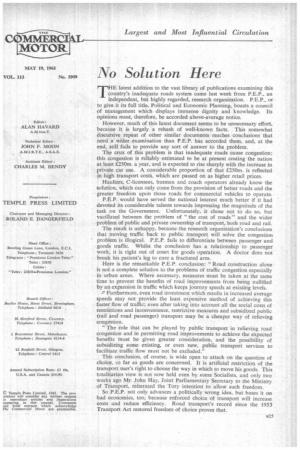No Solution Here
Page 31

If you've noticed an error in this article please click here to report it so we can fix it.
THE latest addition to the vast library of publications examining this country's inadequate roads system came last week from P.E.P., an independent, but highly regarded, research organization. P.E.P., or to give it its full title. Political and Economic Planning, boasts a council of management which displays immense dignity and knowledge. Its opinions must, therefore, be accorded above-average notice.
However, much of this latest document seems to be unnecessary effort, because it is largely a rehash of well-known facts. This somewhat discursive repeat of other similar documents reaches conclusions that need a wider examination than P.E.P. has accorded them, and, at the end, still fails to provide any sort of answer to the problem.
The crux of this problem is that inadequate roads cause congestion; this congestion is reliably estimated to be at present costing the nation at least £250m. a year, and is expected to rise sharply with the increase in private car use. A considerable proportion of that £250m. is reflected in high transport costs, which are passed on as higher retail prices.
Hauliers, C-licensees, busmen and coach operators already know the solution, which can only come from the provision of better roads and the greater freedom upon those roads for commercial vehicles to operate.
P.E.P. would have served the national interest much better if it had devoted its considerable talents towards impressing the magnitude of the task on the Government. Unfortunately, it chose not to do so, but vacillated between the problem of "the cost of roads" and the wider problem of public and private ownership of transport, both road and rail.
The result is unhappy, because the research organization's conclusions that moving traffic back to public transport will solve the congestion problem is illogical. P.E.P. fails to differentiate between passenger and goods traffic. Whilst the conclusion has a relationship to passenger work, it is right out of court for goods operation. A doctor does not break his patient's leg to cure a fractured arm.
Here is the remarkable P.E.P. conclusion: "Road construction alone is not a complete solution to the problems of traffic congestion especially in urban areas. Where necessary, measures must be taken at the sama time to prevent the benefits of road improvements from being nullified by an expansion in traffic which keeps journey speeds at existing levels.
" Furthermore, even road investment which results in increased average speeds may not provide the least expensive method of achieving this faster flow of traffic; even after taking into account all the social costs of restrictions and inconvenience, restrictive measures and subsidized public (rail and road passenger) transport may be a cheaper way of relieving congestion.
"The role that can be played by public transport in relieving road congestion and in permitting road improvements to achieve the expected benefits must be given greater consideration, and the possibility of subsidizing some existing, or even new, public transport services to facilitate traffic flow must not be excluded."
This conclusion, of course, is wide open to attack on the question of choice. E0 far as goods are concerned. It is artificial restriction of the transport user's right to choose the way in which to move his goods. This totalitarian view is not now held even by some Socialists, and only two weeks ago Mr. John Hay, Joint Parliamentary Secretary to the Ministry of Transport, reiterated the Tory intention to allow such freedom.
So P.E.P. not only advances a politically wrong idea, but bases it on bad economics, too, because enforced choice of transport will increase costs and reduce 'efficiency. Road transport's record since the 1953 Transport Act restored freedom of choice proves that.




























































































































